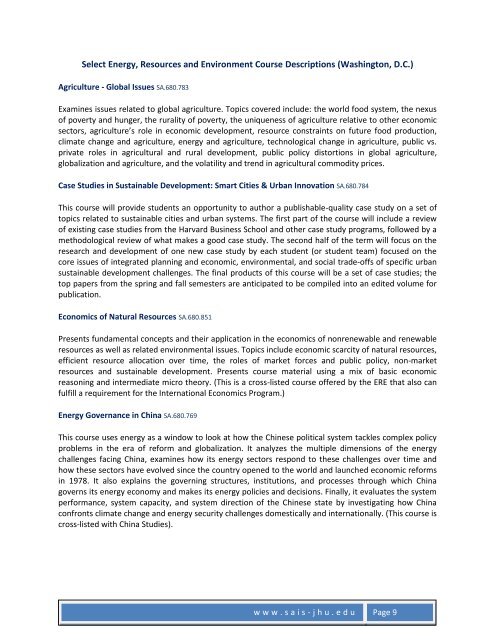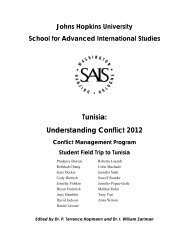energy, resources and environment program - Johns Hopkins ...
energy, resources and environment program - Johns Hopkins ...
energy, resources and environment program - Johns Hopkins ...
You also want an ePaper? Increase the reach of your titles
YUMPU automatically turns print PDFs into web optimized ePapers that Google loves.
Select Energy, Resources <strong>and</strong> Environment Course Descriptions (Washington, D.C.)<br />
Agriculture - Global Issues SA.680.783<br />
Examines issues related to global agriculture. Topics covered include: the world food system, the nexus<br />
of poverty <strong>and</strong> hunger, the rurality of poverty, the uniqueness of agriculture relative to other economic<br />
sectors, agriculture’s role in economic development, resource constraints on future food production,<br />
climate change <strong>and</strong> agriculture, <strong>energy</strong> <strong>and</strong> agriculture, technological change in agriculture, public vs.<br />
private roles in agricultural <strong>and</strong> rural development, public policy distortions in global agriculture,<br />
globalization <strong>and</strong> agriculture, <strong>and</strong> the volatility <strong>and</strong> trend in agricultural commodity prices.<br />
Case Studies in Sustainable Development: Smart Cities & Urban Innovation SA.680.784<br />
This course will provide students an opportunity to author a publishable-quality case study on a set of<br />
topics related to sustainable cities <strong>and</strong> urban systems. The first part of the course will include a review<br />
of existing case studies from the Harvard Business School <strong>and</strong> other case study <strong>program</strong>s, followed by a<br />
methodological review of what makes a good case study. The second half of the term will focus on the<br />
research <strong>and</strong> development of one new case study by each student (or student team) focused on the<br />
core issues of integrated planning <strong>and</strong> economic, <strong>environment</strong>al, <strong>and</strong> social trade-offs of specific urban<br />
sustainable development challenges. The final products of this course will be a set of case studies; the<br />
top papers from the spring <strong>and</strong> fall semesters are anticipated to be compiled into an edited volume for<br />
publication.<br />
Economics of Natural Resources SA.680.851<br />
Presents fundamental concepts <strong>and</strong> their application in the economics of nonrenewable <strong>and</strong> renewable<br />
<strong>resources</strong> as well as related <strong>environment</strong>al issues. Topics include economic scarcity of natural <strong>resources</strong>,<br />
efficient resource allocation over time, the roles of market forces <strong>and</strong> public policy, non-market<br />
<strong>resources</strong> <strong>and</strong> sustainable development. Presents course material using a mix of basic economic<br />
reasoning <strong>and</strong> intermediate micro theory. (This is a cross-listed course offered by the ERE that also can<br />
fulfill a requirement for the International Economics Program.)<br />
Energy Governance in China SA.680.769<br />
This course uses <strong>energy</strong> as a window to look at how the Chinese political system tackles complex policy<br />
problems in the era of reform <strong>and</strong> globalization. It analyzes the multiple dimensions of the <strong>energy</strong><br />
challenges facing China, examines how its <strong>energy</strong> sectors respond to these challenges over time <strong>and</strong><br />
how these sectors have evolved since the country opened to the world <strong>and</strong> launched economic reforms<br />
in 1978. It also explains the governing structures, institutions, <strong>and</strong> processes through which China<br />
governs its <strong>energy</strong> economy <strong>and</strong> makes its <strong>energy</strong> policies <strong>and</strong> decisions. Finally, it evaluates the system<br />
performance, system capacity, <strong>and</strong> system direction of the Chinese state by investigating how China<br />
confronts climate change <strong>and</strong> <strong>energy</strong> security challenges domestically <strong>and</strong> internationally. (This course is<br />
cross-listed with China Studies).<br />
w w w . s a i s - j h u . e d u Page 9
















